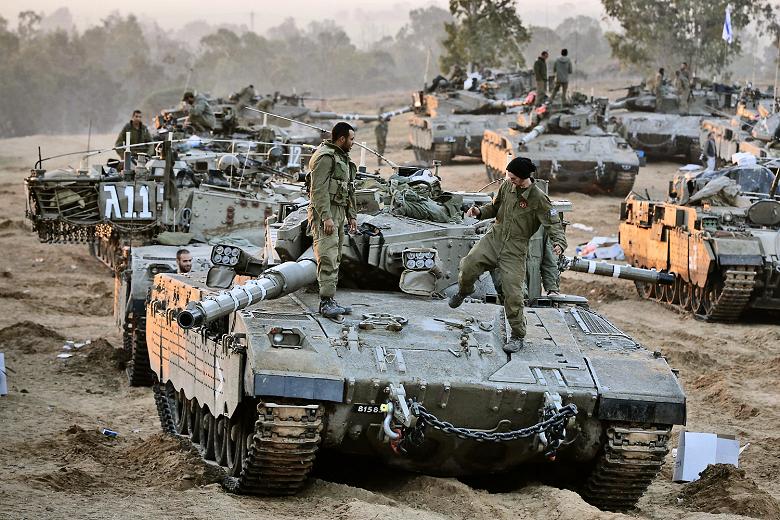IN THE MEDIA
Hamas’ rocket attacks provoked Israel’s ground offensive into Gaza Strip
July 21, 2014 | Sharyn Mittelman

Sharyn Mittelman
Sydney Morning Herald – July 21, 2014
Israel is currently under attack as Hamas and other jihadist groups have fired more than 1600 rockets into its territory this month. The rockets have sent millions of Israeli citizens – Jews, Muslims, Christians, Druze – sprinting into bomb shelters. They have as little as 15 seconds to run for cover. It is not a situation any county would tolerate.
When Hamas attacks began, Israel initially responded with targeted air strikes aimed at stopping the rockets and sent a message to Hamas on July 3 that “quiet will be met with quiet”, adding “Israel has no interest in an escalation. If Hamas reins in the shooting now, we won’t act, either.” But that peace offering was ignored.
Also rejected by Hamas was a July 15 ceasefire proposal by Egypt backed by the Arab League and the Palestinian Authority (PA) and accepted by Israel. The rejection revealed Hamas’ true colours and was widely condemned internationally, including by Foreign Affairs Minister Julie Bishop, who rightly noted: “Hamas claims to represent Gaza, yet it has jeopardised the welfare of its own people by rejecting the proposal for a ceasefire.”
When PA President Mahmoud Abbas implored Hamas to accept the proposal, Moussa Abu Marzouk, the deputy head of Hamas’ political bureau, said while in Cairo “what are 200 martyrs compared with lifting the siege?”
With Hamas rejecting the Egyptian ceasefire deal and rocket attacks into Israel continuing, the final straw was Hamas terrorists emerging from tunnels into Israel to attack a nearby kibbutz. Israel felt it had little choice but to order the ground operation into the Gaza Strip on July 18 to destroy these tunnels, 34 of which have, so far, been discovered.
While the Israeli army is focused on targeting Hamas and other jihadist groups, civilians in Gaza have been killed in the crossfire. For Israel, every civilian death, be it Palestinian or Israeli, is a tragedy to be avoided; for Hamas, Israeli civilians are the target of their rocket fire. Even ambassador Ibrahim Khraishi, the Palestinian representative to the United Nations Human Rights Council, said on July 9 on PA TV: “The missiles that are now being launched against Israel, each and every missile constitutes a crime against humanity, whether it hits or misses, because it is directed at civilian targets.” Khraishi also noted that the Israeli army warns civilians to leave areas before impending strikes.
Yet Hamas leaders sitting safely in their underground bunkers have told Gazans to ignore Israeli warnings and return to their homes, embracing yet again the practice of “human shields”. Hamas fighters not only fire rockets from residential buildings but also use civilian infrastructure for their own purposes, including storage of weapons in schools and mosques. For example, on July 16, about 20 rockets were found in a school in Gaza operated by the United Nations Relief and Works Agency for Palestine Refugees in the Near East (UNRWA). The Washington Post also reported on July 15 that Al-Shifa Hospital in Gaza City has become “a de facto headquarters for Hamas leaders, who can be seen in the hallways and offices”. Hamas’ use of civilian infrastructure is clearly is a war crime as it endangers civilian lives. But, for Hamas, civilian casualties support its propaganda war as the more civilian casualties there are, the more international pressure is placed on Israel.
Israel withdrew from the Gaza Strip in 2005, removing 8000 Israelis and 20 settlements. After a bloody coup in 2007 against its political rival Fatah, Hamas took over the Gaza Strip. Hamas is a Sunni Islamist organisation linked to the Muslim Brotherhood and considered a terrorist group by Australia, Israel, the US, the European Union and Canada, among others. Hamas is committed to Israel’s genocidal destruction, as enshrined in its charter, and it not only encourages rocket attacks into Israel but is responsible for terrorist attacks that have killed hundreds of innocent Israeli civilians.
Today, Hamas is widely disliked among the people it purports to represent. A recent Pew Research Centre poll found 63 per cent of Gazans surveyed held negative views of Hamas and 79 per cent were concerned about Islamist extremism. Some speculate that this latest attack on Israel may be aimed at reviving its flagging popularity and its depleted funding, following reports that Hamas is largely bankrupt. Hamas’ financial woes, and its lost support from Egypt, were also considered reasons why it agreed to a unity government with Fatah in April.
When Israel withdrew from the Gaza Strip in 2005, the area could have flourished but hostility was so strong rockets kept being fired into Israel. Israel imposed a security blockade on Gaza precisely to try and stop the flow of weapons into Gaza and rockets fired into Israel. The UN Palmer report found this blockade to be legal under international law.
Hamas continues to fire rockets into Israel because that is its raison d’etre. Israel has responded to defend its citizens, who cannot possibly be expected to live under incessant rocket attack. The situation has now escalated into a ground-force operation that Israel did not want. But, as this conflict ensues, it is important to remember that Hamas started this round of conflict and had the opportunity to end it, but now Israel’s operation is aimed at degrading Hamas’ extensive terrorist structure to stop the rockets now and into the foreseeable future.
Sharyn Mittelman is a senior policy analyst at the Australia/Israel & Jewish Affairs Council.
This story was found at: http://www.smh.com.au/comment/hamas-rocket-attacks-provoked-israels-ground-offensive-into-gaza-strip-20140720-zuysx.html
Tags: Israel





